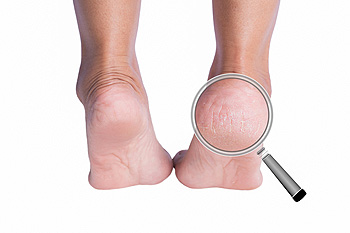What Caused My Cracked Heels?
Monday, 31 August 2020 00:00 Dry, cracked heels can have a variety of different causes. Standing for prolonged periods of time, especially on a hard floor, wearing thin-soled shoes, or obesity, can increase pressure on the heel, causing cracks to appear. Conditions such as eczema, atopic dermatitis, psoriasis, palmoplantar keratoderma, and juvenile plantar dermatosis affect the skin of the feet and could increase the risk of developing cracked heels. Certain systemic conditions, like diabetes or neuropathy, can make one more likely to develop cracks and may make it more difficult to feel those cracks due to a loss in sensation in the feet. Another common cause of dry, cracked heels is footwear without a proper back, such as open sandals and flip-flops, because they expose your heels to the elements and don’t provide adequate support. If you have dry, cracked heels that are causing you pain or discomfort, please seek the care of a podiatrist.
Dry, cracked heels can have a variety of different causes. Standing for prolonged periods of time, especially on a hard floor, wearing thin-soled shoes, or obesity, can increase pressure on the heel, causing cracks to appear. Conditions such as eczema, atopic dermatitis, psoriasis, palmoplantar keratoderma, and juvenile plantar dermatosis affect the skin of the feet and could increase the risk of developing cracked heels. Certain systemic conditions, like diabetes or neuropathy, can make one more likely to develop cracks and may make it more difficult to feel those cracks due to a loss in sensation in the feet. Another common cause of dry, cracked heels is footwear without a proper back, such as open sandals and flip-flops, because they expose your heels to the elements and don’t provide adequate support. If you have dry, cracked heels that are causing you pain or discomfort, please seek the care of a podiatrist.
Cracked heels are unsightly and can cause further damage to your shoes and feet. If you have any concerns, contact Dr. Mark Spier from Maryland. Our doctor can provide the care you need to keep you pain-free and on your feet.
Cracked Heels
Cracked heels appear unappealing and can make it harder for you walk around in sandals. Aside from looking unpleasant, cracked heels can also tear stockings, socks, and wear out your shoes. There are several methods to help restore a cracked heel and prevent further damage.
How Do You Get Them?
Dry skin is the number one culprit in creating cracked heels. Many athletes, walkers, joggers, and even swimmers suffer from cracked heels. Age and skin oil production play a role to getting cracked heels as well.
Promote Healing
Over the counter medicines can help, especially for those that need instant relief or who suffer from chronic dry feet.
Wear Socks – Wearing socks with medicated creams helps lock in moisture.
Moisturizers – Applying both day and night will help alleviate dryness which causes cracking.
Pumice Stones – These exfoliate and remove dead skin, which allows for smoother moisturizer application and better absorption into the skin.
Change in Diet
Eating healthy with a well-balanced diet will give the skin a fresh and radiant look. Your body responds to the kinds of food you ingest. Omega-3 fatty acids and zinc supplements can also revitalize skin tissue.
Most importantly, seek professional help if unsure how to proceed in treating cracked heels. A podiatrist will help you with any questions or information needed.
If you have any questions, please feel free to contact one of our offices located in Columbia and Reisterstown, MD . We offer the newest diagnostic and treatment technologies for all your foot care needs.









